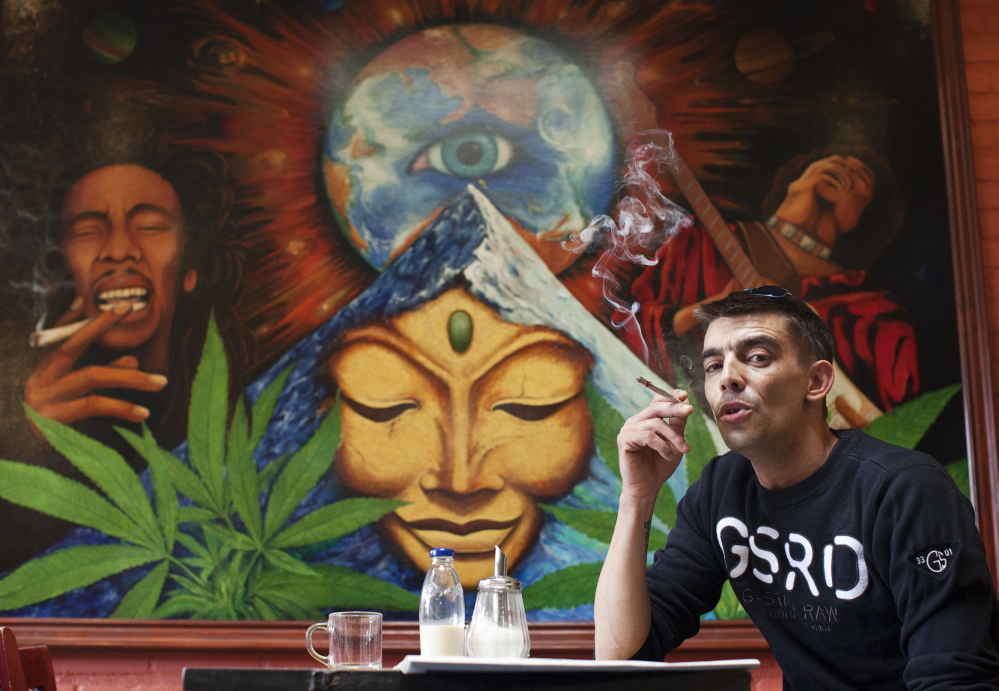MAASTRICHT, Netherlands — A young man at a bus stop hisses at a passer-by: “What you looking for … marijuana?” It’s a scene of street peddling that the Netherlands hoped to stamp out in the 1970s when it launched a policy of tolerating “coffee shops” where people could buy and smoke pot freely.
But Maastricht’s street dealers are back, local residents complain. And the reason is a crackdown on coffee shops triggered by another problem: Pot tourists who crossed the border to visit the cafes and made a nuisance of themselves by snarling traffic, dumping litter and even urinating in the streets.
This exchange of one drug problem for another has become a headache for Maastricht – and may give reason for pause in the U.S. states of Washington and Colorado that recently allowed the sale of marijuana for the first time. The Netherlands, the world pioneer in pot liberalization, has recently taken a harder line toward marijuana, with mixed results seen particularly in border towns such as Maastricht.
The central government clampdown has involved banning people who live outside the Netherlands from coffee shops, and shuttering shops that are deemed to be too close to schools. There was even a short-lived policy that said smokers had to apply for a “Weed Pass” to get into a coffee shop. The new rules were rolled out across the country between the middle of 2012 and 2013.
But while the central government made the rules, it’s up to local municipalities to enforce them – and most are embracing only part of the policy.
Amsterdam – with some 200 licensed coffee shops, one-third of the nationwide total – still lets foreigners visit them, although it is closing coffee shops that are near schools.
One city that has embraced the crackdown whole-heartedly is Maastricht, in the southern province of Limburg close to the Dutch borders with Belgium and Germany.
Its mayor, Onno Hoes, says he enforced the legislation to halt a daily influx of thousands of foreigners who crossed the borders to stock up on pot at its 14 coffee shops. That effort to end so-called “drug tourism” has been successful, local residents say, but the flip side has been a rise in street dealers like the man who recently tried to sell pot to an AP reporter in Maastricht.
Carol Berghmans lives close to the River Maas, whose muddy waters bisect the city, and whose banks are frequented by dealers he sees as he walks his dog each day.
He says there were certainly problems before the crackdown as cars filled with pot tourists poured into the cobbled streets of central Maastricht – but he described the atmosphere as “gezellig,” a Dutch word that loosely translates as cozy or convivial.
Since coffee shops were banned from selling to nonresidents, the numbers of foreigners has dried up. But the atmosphere in town has turned darker as street dealers now aggressively badger any potential clients and fight among themselves, Berghmans says.
“Now the drug runners are trying to sell on the street to anyone,” he says. “They are bothering everybody.”
Maastricht city spokesman Gertjan Bos said the problem of street dealing is not new, but concedes it has become more visible since the city’s crackdown reduced the number of drug tourists.
“We have a feeling our approach is working,” Bos said, “but we do still have to work on the street dealers.”
Amsterdam’s coffee shops, by contrast, continue to welcome foreigners with open arms.
In Amsterdam, tourists mostly arrive by plane or train, stay in a hotel and visit museums and restaurants – as well as dropping in on a coffee shop – plowing far more cash into the city.
Copy the Story LinkSend questions/comments to the editors.



Success. Please wait for the page to reload. If the page does not reload within 5 seconds, please refresh the page.
Enter your email and password to access comments.
Hi, to comment on stories you must . This profile is in addition to your subscription and website login.
Already have a commenting profile? .
Invalid username/password.
Please check your email to confirm and complete your registration.
Only subscribers are eligible to post comments. Please subscribe or login first for digital access. Here’s why.
Use the form below to reset your password. When you've submitted your account email, we will send an email with a reset code.